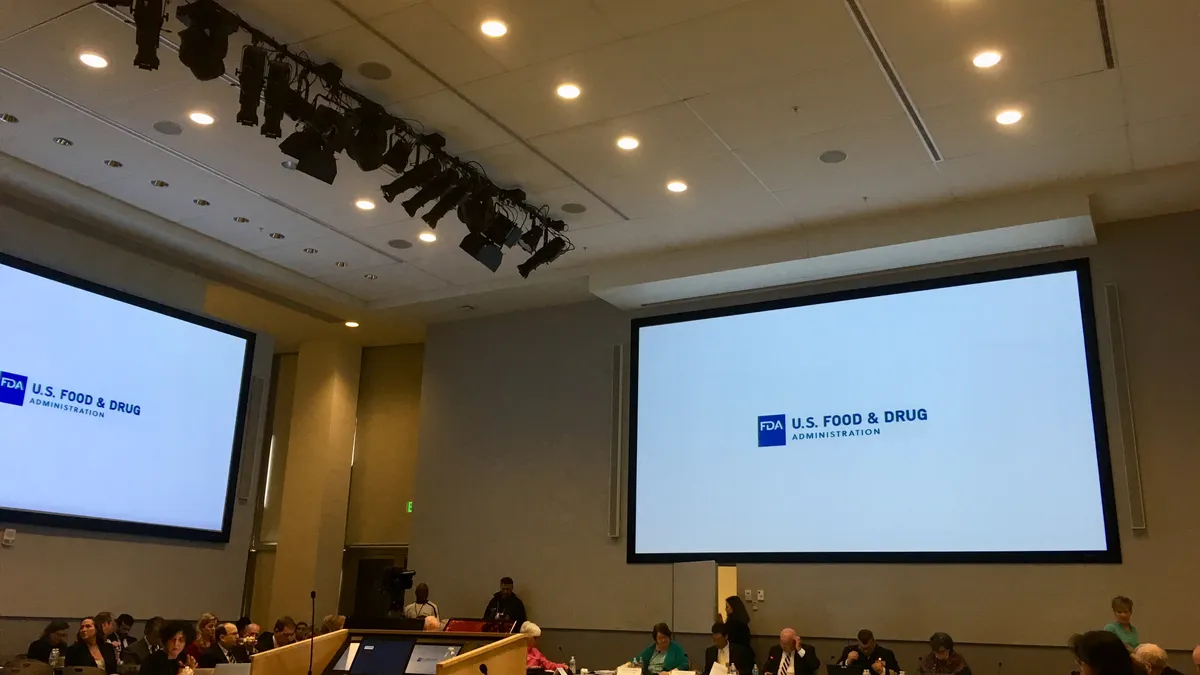UPDATE: Aug. 26, 2021: FDA will hold its advisory panel over two days on Nov. 2 and 3, 2021, the agency announced. The first day will probe Endologix' AFX endovascular graft system and the risk of Type III endoleaks and "whether further actions are necessary," for the product.
On Nov. 3, the committee will look at broader endovascular stent safety, the best use of real world data for both current and future devices and what clinical outcomes are most relevant.
Dive Brief:
- An FDA advisory committee will take up the safety and effectiveness of endovascular stent grafts for treating abdominal aortic aneurysms, and assess whether further action is needed to address a leak risk associated with manufacturer Endologix's AFX grafts, during a two-day meeting set for the fourth quarter, the agency announced on Monday.
- In addition to evaluating new data collected on the Endologix devices, the panel of outside experts is expected to make recommendations on postmarket surveillance strategies for all endovascular grafts used to treat AAA. Other companies that sell endovascular AAA graft products include Medtronic, Cook Medical, Gore and Terumo.
- FDA first announced its intention to convene the meeting of its Circulatory System Devices Panel late last year, when it updated a 2019 safety alert with additional postmarket data on the Endologix grafts. The meeting will be conducted virtually, with the exact date to be set later.
Dive Insight:
An abdominal aortic aneurysm is an enlarged area in the wall of the aorta that can become vulnerable to a deadly rupture if left untreated. Endovascular grafting, a minimally invasive procedure to place a stent graft in the aorta, is increasingly used as an alternative to open surgery for aneurysm repair. The graft diverts blood flow to relieve pressure on the weakened section of the vessel.
The first day of FDA's panel meeting will focus on evaluating data suggesting a heightened risk of blood continuing to leak into the aneurysm sac in patients who received Endologix's AFX devices. Reports of blood flowing back into the aneurysm, increasing the likelihood of it bursting, prompted the company to recall the products in 2018. FDA's 2019 safety alert stressed the need for lifelong followup of patients implanted with three versions of the graft: AFX with Strata, AFX with Duraply, and AFX2.
Endologix has also faced problems with another endovascular aneurysm repair device, its Ovation iX stent graft system, including reports of five patient deaths, culminating in the product's recall last year.
The company secured FDA's approval in March 2020 to market another AAA graft called Alto. But by July, declining revenues led Endologix to announce it would file for Chapter 11 bankruptcy reorganization. Supported by its largest creditor, Deerfield Partners, the device maker now operates as a private company.
On day two of the panel meeting, FDA said its advisers will look at the overall category of endovascular stent grafts to assess the products' continued safety and effectiveness. In particular, the committee will consider how to strengthen real-world collection of data tracking the long-term performance of currently marketed as well as future stent graft devices.
FDA intends to ask the panel for feedback on which clinical outcomes are most relevant to capture in the real world, at what frequency, and for what duration. The regulator said it is also seeking advice from the panel on data gathering platforms and how to incentivize and make the best use of real-world data collection.











